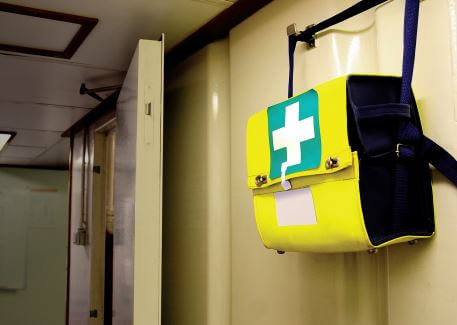Resources
A collection of free resources to help you raise funds and share the work we do

By Natalie Shaw
I have been very privileged to be in[1]volved in developing a medical guide that I truly believe will help save seafarers’ lives. When a medical emergency happens on a vessel, immediate medical care is critical, and for that reason, the International Chamber of Shipping (ICS) has published the new International Medical Guide for Seafarers and Fishers in collaboration with the International Maritime Health Association and the International Transport Workers’ Federation.
For nearly two years, ICS worked with a team of medical experts to gather the latest medical knowledge on all injuries, illnesses, and health issues experienced on ships and fishing vessels. All members of the guide’s technical review group dedicated themselves to creating a medical guide that could improve seafarers’ working conditions and make a remarkable difference in seafarers’ and fishers’ lives while on board vessels.
Myriad situations arise on a ship requiring immediate medical attention including, for example, dehydration from working in a hot engine room or trips and falls from navigating passageways during seagoing conditions. Within the guide, appropriate action is explained in a practical format aiming to ensure that a seafarer receives the right advice and medical care on the vessel, so that there is a much better chance of a positive end result.
The International Medical Guide for Seafarers and Fishers comprises three sections:
The entire guide features an easy-to-use format for a non-medical professional to navigate and apply in a medical situation, by way of 3D visual aids, tables, charts, and assessments to help crew follow procedures correctly.
Universally understood
In developing this medical guide, ICS has placed emphasis on the importance of using terminology that can be understood internationally due to the many nationalities involved in modern seafaring, and including the latest medicines that can be sourced in all regions of the world.
Intended to accelerate medical care provision at the place where it is needed, the International Medical Guide for Seafarers and Fishers also assists ships sailing under flags without a national guide. It includes new dedicated chapters on assessing and treating mental health issues and seasickness, and how to communicate with telemedical services.
As all seafarers know, the remote nature of shipping may sometimes require practical information to be readily available to them during the first crucial moments after an on board medical emergency arises. This knowledge guided ICS and the entire team of medical experts to create this completely new, comprehensive, and practical guide designed to make a really positive difference for today’s seafarers.
Natalie Shaw MBE is director of employment affairs at the International Chamber of Shipping. The International Medical Guide for Seafarers and Fishers is available in print and digital ebook from https://publications. ics-shipping.org.